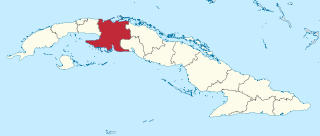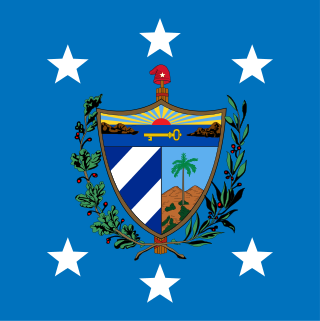Related Research Articles

Operation Northwoods was a proposed false flag operation that originated within the US Department of Defense of the United States government in 1962. The proposals called for CIA operatives to both stage and commit acts of terrorism against American military and civilian targets, blame them on the Cuban government, and use them to justify a war against Cuba. The possibilities detailed in the document included the remote control of civilian aircraft which would be secretly repainted as US Air Force planes, a fabricated 'shoot down' of a US Air Force fighter aircraft off the coast of Cuba, the possible assassination of Cuban immigrants, sinking boats of Cuban refugees on the high seas, blowing up a U.S. ship, and orchestrating terrorism in U.S. cities. The proposals were rejected by President John F. Kennedy.
Bolero is a genre of song which originated in eastern Cuba in the late 19th century as part of the trova tradition. Unrelated to the older Spanish dance of the same name, bolero is characterized by sophisticated lyrics dealing with love. It has been called the "quintessential Latin American romantic song of the twentieth century".

Matanzas is one of the provinces of Cuba. Major towns in the province include Cárdenas, Colón, Jovellanos and the capital of the same name, Matanzas. The resort town of Varadero is also located in this province.

The Straits of Florida, Florida Straits, or Florida Strait is a strait located south-southeast of the North American mainland, generally accepted to be between the Gulf of Mexico and the Atlantic Ocean, and between the Florida Keys (U.S.) and Cuba. It is 93 mi (150 km) wide at the narrowest point between Key West and the Cuban shore, and has been sounded to a depth of 6,000 feet (1,800 m). The strait carries the Florida Current, the beginning of the Gulf Stream, from the Gulf of Mexico.

The president of Cuba, officially the president of the Republic of Cuba, is the head of state of Cuba. The office in its current form was established under the Constitution of 2019. The President is the second-highest office in Cuba and the highest state office. Miguel Díaz-Canel became President of the Council of State on 19 April 2018, taking over from Raúl Castro, and has been President of Cuba since 10 October 2019.

Cuban cuisine is largely based on Spanish cuisine with influence from Taino, African and other Caribbean cuisines. Some Cuban recipes share spices and techniques with Spanish, Taino and African cooking, with some Caribbean influence in spice and flavor. This results in a blend of several different cultural influences. A small but noteworthy Chinese influence can also be accounted for, mainly in the Havana area. There is also some Italian influence. During colonial times, Cuba was an important port for trade, and the Spanish ancestors of Cubans brought with them the culinary traditions of different parts of Spain.

The Central Bank of Cuba is the central bank of Cuba. It was created in 1997 to take over many of the functions of the National Bank of Cuba, which was established on 23 December 1948 and began operations on 27 April 1950.

The Cuba national football team represents Cuba in men's international football, and is controlled by the Football Association of Cuba. Nicknamed Leones del Caribe, the team represents all three FIFA, Caribbean Football Union and Confederation of North, Central American and Caribbean Association Football (CONCACAF).
.cu is the country code top-level domain (ccTLD) for Cuba.

Floribbean cuisine refers to a fusion cuisine found in Florida with an emphasis on fresh regional ingredients and complex medleys of spices, especially strong flavors offset by milder ones. Floribbean-style cooking incorporates an exotic spice pantry: red curry, lemongrass, ginger, and scallions are as commonly used today in Floribbean cookery as grits and cobbler are in other parts of Florida. Foundationally, its bedrock is Conch, Black, Spanish and Cuban regional cooking, with heavy Asian influences.

Cuban espresso, also known as Café Cubano, is a type of espresso that originated in Cuba. Specifically, it refers to an espresso shot which is sweetened. However, the name can refer to coffee based drinks that include Cuban espresso as the main ingredient, such as café con leche.

Ropa vieja is a dish with regional variations in Latin America, the Philippines, and Spain. It normally includes some form of stewed beef and tomatoes with a sofrito base. Originating in Spain, it is known today as one of the national dishes of Cuba. The name ropa vieja probably originates from the fact that it was often prepared using food left over from other meals, although it has been suggested that the name comes from the "tattered appearance" of the meat.

Havana's International Book Fair is an annual public festival to promote Cuban government sanctioned books and writing that spans between February and March. The festival begins in Havana at the Fortaleza de San Carlos de la Cabaña, an 18th-century Spanish construction, and spreads east and west of the capital to all provinces and many municipalities. The book fair ends in the eastern city of Santiago de Cuba. The fair first took place in 1982, and occurred every two years until 2000 when it became an annual tradition. The festival consists of book vendors, poetry readings, children’s activities, art exhibitions, and concerts in the evenings. It is considered Cuba’s premier cultural event, as well as the event with the highest attendance in Havana. The 18th annual International Book Fair in 2009 had approximately 600,000 visitors.
Filipino Cubans are Cubans of Filipino ancestry. Filipinos have been settling in Cuba since the 16th century and they are one of the earliest Asian communities in the country.

Cuba–Turkey relations are foreign relations between Cuba and Turkey.

El Cubo de Cuba, or simply Cubo, is a Cuban restaurant in Portland, Oregon.
References
- Granma; Proposal for human rights council favors major powers; April 13, 2005